Unit 1 Festivals around the world情态动词课件
文档属性
| 名称 | Unit 1 Festivals around the world情态动词课件 |  | |
| 格式 | zip | ||
| 文件大小 | 84.8KB | ||
| 资源类型 | 教案 | ||
| 版本资源 | 人教版(新课程标准) | ||
| 科目 | 英语 | ||
| 更新时间 | 2014-03-03 20:36:51 | ||
图片预览





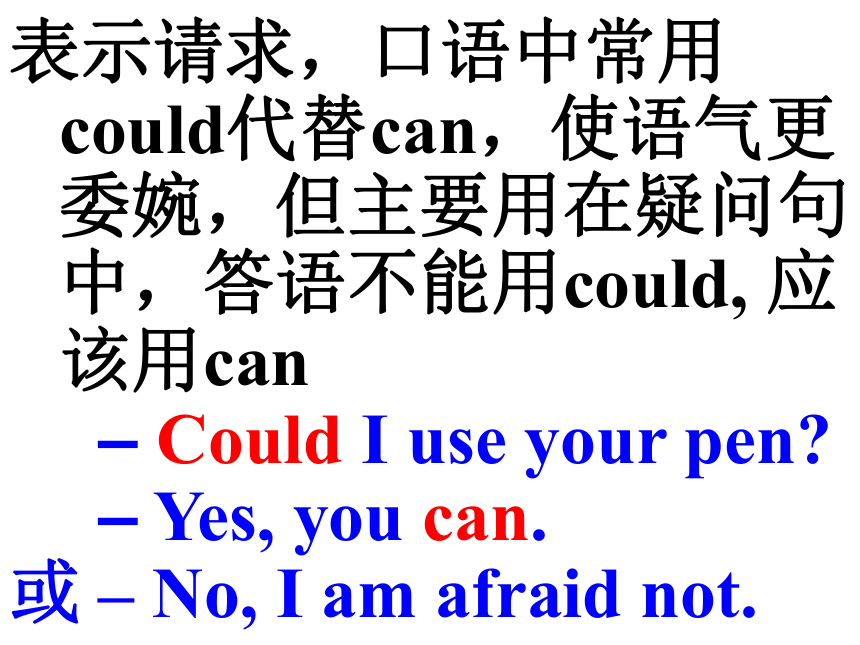

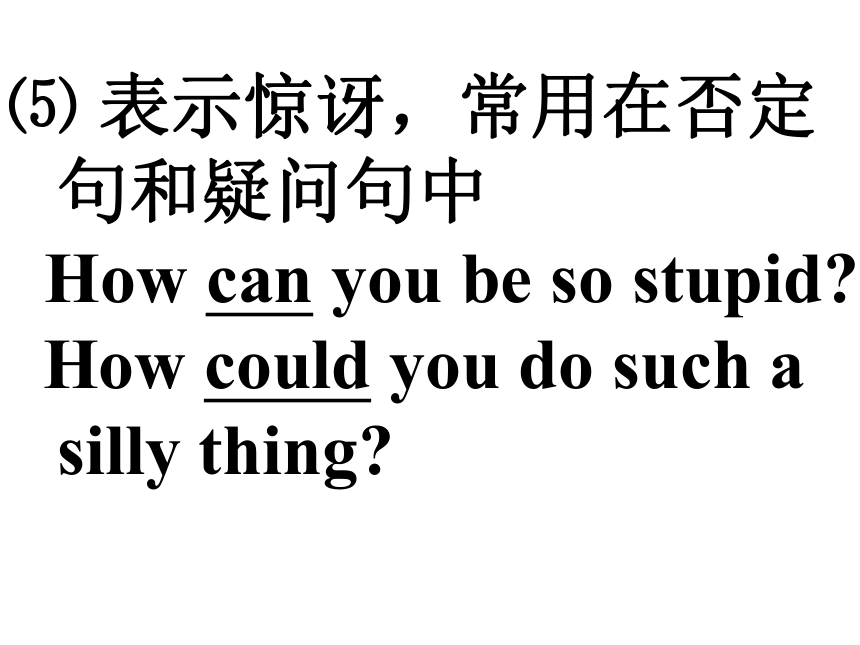
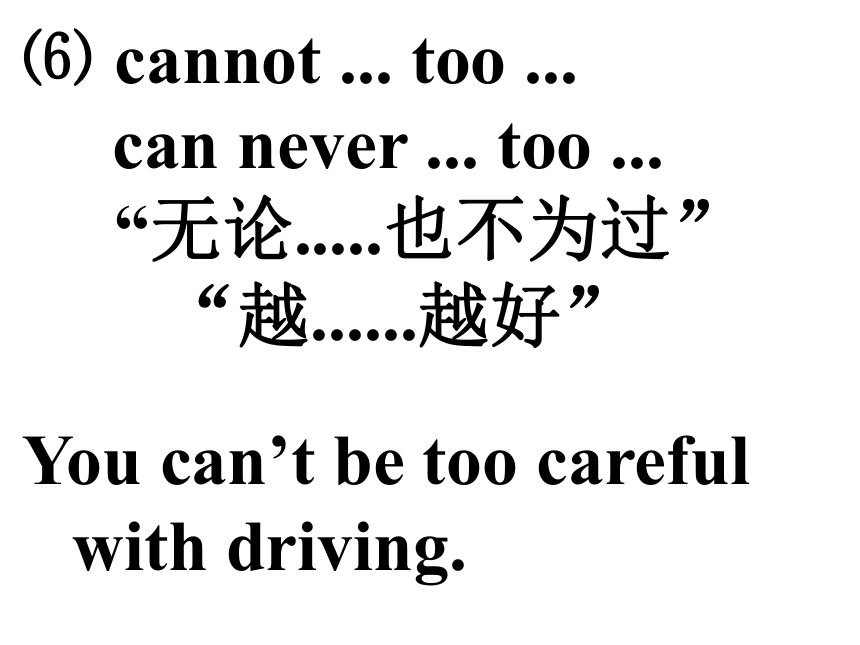
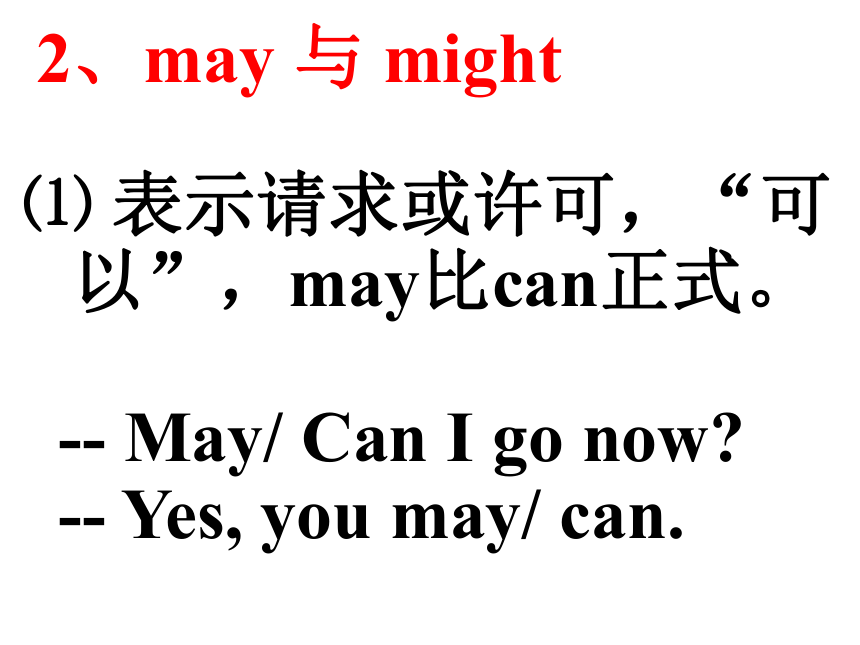

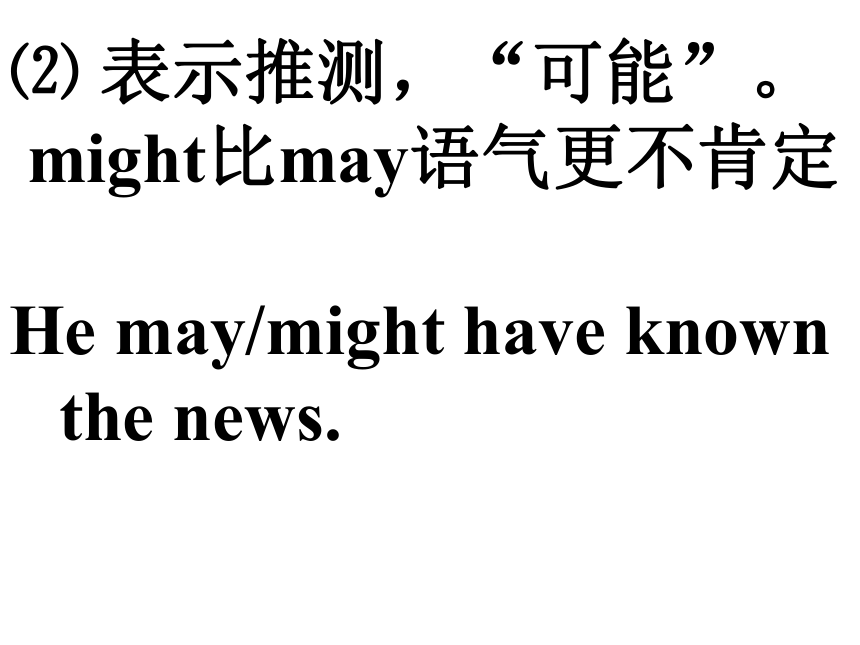
文档简介
课件44张PPT。情态动词情态动词表示说话人的语气或对事物所持的态度。
情态动词有一定的词义,但不能单独做谓语。
情态动词没有人称和数的变化,后面应接动词原形1. can 与 could⑴ 表示能力,“能,会”
We can use the computer now, but we couldn’t last year.
be able to do sth.表示有能力做某事,并且做了⑵表示推测,常用在否定句或疑问句中
I saw him just now. He can’t have gone to Beijing.
You couldn’t have left it on the bus.⑶表示允许或请求,在口语中可以用can代替may,但may比can正式
-- May/ Can I come in?
-- Yes, you may/ can.表示请求,口语中常用could代替can,使语气更委婉,但主要用在疑问句中,答语不能用could, 应该用can
– Could I use your pen?
– Yes, you can.
或 – No, I am afraid not.(4) 表示客观可能性,表理论上的可能
It is usually very warm in April, but it can be rather cold sometimes.⑸ 表示惊讶,常用在否定句和疑问句中
How can you be so stupid?
How could you do such a silly thing?⑹ cannot ... too ...
can never ... too ...
“无论.....也不为过”
“越......越好”
You can’t be too careful with driving.2、may 与 might⑴ 表示请求或许可,“可以”,may比can正式。
-- May/ Can I go now?
-- Yes, you may/ can.might比may语气更委婉,没有时间上的区分。但在might引起的疑问句中,答语不用might, 应该用may
– Might/ May I have a look?
– Yes, you may.
或 Yes, please./ Certainly.
No, you mustn’t.
或 No, you’d better not.⑵ 表示推测,“可能”。
might比may语气更不肯定
He may/might have known the news.(3) 在机关、学校等的文书、公告中, 表示“不得......”,, “禁止......”,可以用may not或mustn’t
You may not smoke in the classroom.⑷ might as well
may as well 不妨,最好
You may/might as well do it at once.⑸ may well 很可能
They may well win.⑹may 用于祈使句,表示祝愿
May you succeed!⑴表示意志、决心和愿望
I will never do that again.
They asked us if we would do that again.3、will 与 would⑵用于第二人称,表示询问对方或向对方提出请求。
would语气更委婉。
Will you send this letter for me?
Would you mind my opening the window? ⑶ 表示习惯性、倾向性动作,“会,将会,常常,总是”
Fish will die out of water.
She would sit like that for hours.4、shall 与 should⑴ shall
用于二、三人称,陈述句
用于一、三人称,疑问句
用于第一人称,陈述句《自主学习》Page 15⑵ should表示义务、责任
“应当、应该”
We should study harder.⑶ should可用于if引导的虚拟条件句,表示语气较强的假设,“万一”
If Mr Li should have time tomorrow, we could ask him questions.⑷should表示推论、推测、可能性,“应该,可能”
Dinner should be ready by now.⑸should表示说话者对某事难以置信,感到惊讶,“竟然”
I am sorry that he should be so careless.5、must⑴ must表示“必须,应当”
mustn’t “禁止,不准”
Soldiers must obey orders.
过去、将来、完成等时态中表示“必须”时,可用have to 的相应形式。注意must疑问句的答语:
-- Must I go now?
-- Yes, you must.
-- No, you needn’t.
No, you don’t have to.⑵ 表示推测,用于肯定句,表示某事肯定会发生
You must be very tired.
He must have been tired.(3) (表示不可避免性或肯定性),“必然要,必定会”。
Man must die. 人必有一死⑷ 表示与说话人愿望相反及不耐烦,“偏要”
Why must it rain on Sunday?6、ought to“应该”, 语气比should重。
否定形式:ought not to
oughtn’t to
You ought to be careful.
You oughtn’t to have let out the secret.7、have to“必须,不得不”,表示客观需要。而must表示说话人的主观看法。
I had to get up early.
I don’t have to get up early.
I will have to get up early.8、need可作实义动词、情态动词⑴ 作情态动词时:
need “需要”,没有人称、数和时态的变化。多用于否定句、疑问句和条件状语从句,一般不用于肯定句 – Need I come?
– Yes, you must.
No, you needn’t.⑵作实义动词时:
need “需要”,有人称、数和时态的变化。
She needs to be more careful.
She doesn’t need to be more careful.
Does she need to be more careful?9、dare可作实义动词、情态动词
“敢,敢于”⑴作情态动词时:
dare “敢,敢于”,多用于疑问句、否定句和条件状语从句,一般不用于肯定句。没有人称和数的变化,但有过去式 dared
I dare not go out at night.⑵作实义动词时,有人称、数和时态的变化。
dare “敢,敢于” dare做实义动词时
She dares to go out at night.
She doesn’t dare (to) go out at night.
否定句中可省略to10、used to “过去常常”He used to go there.
否定形式:
He didn’t use to go there.
He usedn’t to go there.
He usen’ t to go there.(不常用)would 过去常常......
表示过去的状态,只能用used to,不能用would
There used to be a big tree in my yard.11、had better“最好(做)......”
We had better go now.
We had better not go now.12、情态动词+have done1、表示对过去事情的推测
must have done用于肯定句
can have done用于否定句
和疑问句
may/might have done一般用于肯定句和否定句中2、表示对过去没有实现的事情感到后悔、责备或遗憾
could have done本来能够
might have done本来可以
should have done本来应该
would have done本来将会
need have done本来需要1-10 ABCDC BBBCD
11-20 DADAA AAAAA
21-30 CDCBA DCBCB
31-40 DABCD BBCDD
41-50 BAABC BADDC
51-60 BADCB ADCCD
61-70 BCBDC ADCCC
情态动词有一定的词义,但不能单独做谓语。
情态动词没有人称和数的变化,后面应接动词原形1. can 与 could⑴ 表示能力,“能,会”
We can use the computer now, but we couldn’t last year.
be able to do sth.表示有能力做某事,并且做了⑵表示推测,常用在否定句或疑问句中
I saw him just now. He can’t have gone to Beijing.
You couldn’t have left it on the bus.⑶表示允许或请求,在口语中可以用can代替may,但may比can正式
-- May/ Can I come in?
-- Yes, you may/ can.表示请求,口语中常用could代替can,使语气更委婉,但主要用在疑问句中,答语不能用could, 应该用can
– Could I use your pen?
– Yes, you can.
或 – No, I am afraid not.(4) 表示客观可能性,表理论上的可能
It is usually very warm in April, but it can be rather cold sometimes.⑸ 表示惊讶,常用在否定句和疑问句中
How can you be so stupid?
How could you do such a silly thing?⑹ cannot ... too ...
can never ... too ...
“无论.....也不为过”
“越......越好”
You can’t be too careful with driving.2、may 与 might⑴ 表示请求或许可,“可以”,may比can正式。
-- May/ Can I go now?
-- Yes, you may/ can.might比may语气更委婉,没有时间上的区分。但在might引起的疑问句中,答语不用might, 应该用may
– Might/ May I have a look?
– Yes, you may.
或 Yes, please./ Certainly.
No, you mustn’t.
或 No, you’d better not.⑵ 表示推测,“可能”。
might比may语气更不肯定
He may/might have known the news.(3) 在机关、学校等的文书、公告中, 表示“不得......”,, “禁止......”,可以用may not或mustn’t
You may not smoke in the classroom.⑷ might as well
may as well 不妨,最好
You may/might as well do it at once.⑸ may well 很可能
They may well win.⑹may 用于祈使句,表示祝愿
May you succeed!⑴表示意志、决心和愿望
I will never do that again.
They asked us if we would do that again.3、will 与 would⑵用于第二人称,表示询问对方或向对方提出请求。
would语气更委婉。
Will you send this letter for me?
Would you mind my opening the window? ⑶ 表示习惯性、倾向性动作,“会,将会,常常,总是”
Fish will die out of water.
She would sit like that for hours.4、shall 与 should⑴ shall
用于二、三人称,陈述句
用于一、三人称,疑问句
用于第一人称,陈述句《自主学习》Page 15⑵ should表示义务、责任
“应当、应该”
We should study harder.⑶ should可用于if引导的虚拟条件句,表示语气较强的假设,“万一”
If Mr Li should have time tomorrow, we could ask him questions.⑷should表示推论、推测、可能性,“应该,可能”
Dinner should be ready by now.⑸should表示说话者对某事难以置信,感到惊讶,“竟然”
I am sorry that he should be so careless.5、must⑴ must表示“必须,应当”
mustn’t “禁止,不准”
Soldiers must obey orders.
过去、将来、完成等时态中表示“必须”时,可用have to 的相应形式。注意must疑问句的答语:
-- Must I go now?
-- Yes, you must.
-- No, you needn’t.
No, you don’t have to.⑵ 表示推测,用于肯定句,表示某事肯定会发生
You must be very tired.
He must have been tired.(3) (表示不可避免性或肯定性),“必然要,必定会”。
Man must die. 人必有一死⑷ 表示与说话人愿望相反及不耐烦,“偏要”
Why must it rain on Sunday?6、ought to“应该”, 语气比should重。
否定形式:ought not to
oughtn’t to
You ought to be careful.
You oughtn’t to have let out the secret.7、have to“必须,不得不”,表示客观需要。而must表示说话人的主观看法。
I had to get up early.
I don’t have to get up early.
I will have to get up early.8、need可作实义动词、情态动词⑴ 作情态动词时:
need “需要”,没有人称、数和时态的变化。多用于否定句、疑问句和条件状语从句,一般不用于肯定句 – Need I come?
– Yes, you must.
No, you needn’t.⑵作实义动词时:
need “需要”,有人称、数和时态的变化。
She needs to be more careful.
She doesn’t need to be more careful.
Does she need to be more careful?9、dare可作实义动词、情态动词
“敢,敢于”⑴作情态动词时:
dare “敢,敢于”,多用于疑问句、否定句和条件状语从句,一般不用于肯定句。没有人称和数的变化,但有过去式 dared
I dare not go out at night.⑵作实义动词时,有人称、数和时态的变化。
dare “敢,敢于” dare做实义动词时
She dares to go out at night.
She doesn’t dare (to) go out at night.
否定句中可省略to10、used to “过去常常”He used to go there.
否定形式:
He didn’t use to go there.
He usedn’t to go there.
He usen’ t to go there.(不常用)would 过去常常......
表示过去的状态,只能用used to,不能用would
There used to be a big tree in my yard.11、had better“最好(做)......”
We had better go now.
We had better not go now.12、情态动词+have done1、表示对过去事情的推测
must have done用于肯定句
can have done用于否定句
和疑问句
may/might have done一般用于肯定句和否定句中2、表示对过去没有实现的事情感到后悔、责备或遗憾
could have done本来能够
might have done本来可以
should have done本来应该
would have done本来将会
need have done本来需要1-10 ABCDC BBBCD
11-20 DADAA AAAAA
21-30 CDCBA DCBCB
31-40 DABCD BBCDD
41-50 BAABC BADDC
51-60 BADCB ADCCD
61-70 BCBDC ADCCC
同课章节目录
- 词法
- 名词
- 动词和动词短语
- 动词语态
- 动词时态
- 助动词和情态动词
- 非谓语动词
- 冠词
- 代词
- 数词和量词
- 形容词副词及其比较等级
- 介词和介词短语
- 连词和感叹词
- 构词法
- 相似、相近词比较
- 句法
- 陈述句
- 一般疑问句和否定疑问句
- 特殊疑问句及选择疑问句
- 反意疑问句
- 存在句(There be句型)
- 宾语从句
- 定语从句
- 状语从句
- 主谓一致问题
- 简单句
- 并列句
- 复合句
- 主谓一致
- 主、表语从句
- 名词性从句
- 直接引语和间接引语
- 虚拟语气
- 感叹句
- 强调句
- 倒装句
- 祈使句
- 句子的成分
- 句子的分类
- 题型专区
- 单项选择部分
- 易错题
- 完形填空
- 阅读理解
- 词汇练习
- 听说训练
- 句型转换
- 补全对话
- 短文改错
- 翻译
- 书面表达
- 任务型阅读
- 语法填空
- 其他资料
